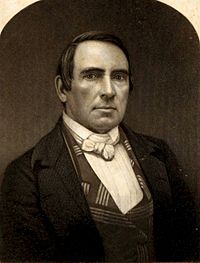Joseph R. Underwood facts for kids
Quick facts for kids
Joseph R. Underwood
|
|
|---|---|
 |
|
| United States Senator from Kentucky |
|
| In office March 4, 1847 – March 3, 1853 |
|
| Preceded by | James T. Morehead |
| Succeeded by | John B. Thompson |
| Member of the U.S. House of Representatives from Kentucky's 3rd district |
|
| In office March 4, 1835 – March 3, 1843 |
|
| Preceded by | Christopher Tompkins |
| Succeeded by | Henry Grider |
| Member of the Kentucky House of Representatives | |
| In office 1816–1819 1825–1826 |
|
| Personal details | |
| Born |
Joseph Rogers Underwood
October 24, 1791 Goochland County, Virginia, U.S. |
| Died | August 23, 1876 (aged 84) Bowling Green, Kentucky, U.S. |
| Political party | Whig |
| Other political affiliations |
Democrat |
| Spouses | Eliza McCowes Trotter (d. 1835) Elizabeth Threlkeld Cox |
| Children | Eugene Underwood, Julia Underwood Cox, Eliza Underwood Rutledge, Jane Underwood Rogers, John C. Underwood, Robert Underwood, Lily Underwood Munford, and Josephine Underwood Woods |
| Alma mater | Transylvania University |
| Profession | Politician, Lawyer |
| Signature | |
| Military service | |
| Branch/service | United States Army |
| Battles/wars | War of 1812 |
Joseph Rogers Underwood (born October 24, 1791 – died August 23, 1876) was an important American politician from Kentucky. He worked as a lawyer and a judge. He also served in both the United States House of Representatives and the United States Senate.
Contents
Early Life and Education
Joseph Underwood was born in Goochland County, Virginia. His father, John Underwood, was a soldier in the American Revolutionary War. Joseph had a younger brother, Warner Lewis Underwood, who also became a politician in Kentucky.
In 1803, Joseph moved to Barren County, Kentucky, and lived with his uncle. He went to private schools and then graduated from Transylvania College in Lexington, Kentucky, in 1811. He started studying law, but he paused his studies to join the military. He served as a Lieutenant in the Kentucky Infantry during the War of 1812.
Family Life
Joseph Underwood married Eliza McCowes Trotter in 1817. They had several children together. After Eliza passed away in 1835, Joseph married Elizabeth Threlkeld Cox. They also had children. Some of his children included Eugene Underwood, Julia Underwood Cox, Eliza Underwood Rutledge, Jane Underwood Rogers, John C. Underwood, Robert Underwood, Lily Underwood Munford, and Josephine Underwood Woods.
Political Career
Joseph Underwood became a lawyer in 1813 and started his practice in Glasgow, Kentucky. He also worked as a town trustee and county auditor.
Serving in the Kentucky Legislature
Underwood was elected to the Kentucky House of Representatives and served from 1816 to 1819. In 1823, he moved to Bowling Green, Kentucky. He was elected to the State House of Representatives again, serving from 1825 to 1826.
He ran for lieutenant governor of Kentucky in 1828 but did not win. From 1828 to 1835, he worked as a judge for the Court of Appeals.
National Politics
Underwood was a member of the Whig Party. He did not agree with President Andrew Jackson. He was elected to the United States House of Representatives for Kentucky's 3rd District. He served from 1835 to 1843. During this time, he was in charge of the U.S. House Committee on the District of Columbia. He decided not to run for re-election in 1843 and went back to being a lawyer.
In 1844, he helped campaign for the Whig presidential candidate. Voters elected him to the State House again in 1846, where he became the speaker.
Underwood was then elected as a Whig to the United States Senate. He served as a Senator from 1847 to 1853. He did not run for re-election after this term.
Views on Slavery and the Civil War
Joseph Underwood believed that slavery should end. He freed his own enslaved people and helped them move to Liberia. He also encouraged other people to do the same. Even though he wanted slavery to end, he supported the Compromise of 1850. This compromise tried to solve disagreements between states about slavery.
Before the American Civil War, Underwood supported the Constitutional Union Party in Kentucky. He inherited seven enslaved people in 1858, but he freed them right away. He wanted slavery to end gradually, not immediately. He also believed that the federal government should not make laws about slavery for the states. However, he was strongly against states leaving the United States.
He was elected to the state legislature again from 1861 to 1863. During this time, he worked to keep Kentucky from joining the states that left the Union. He was a strong supporter of the Union during the Civil War. However, two of his sons fought for the Confederacy. After the war, he helped rebuild the Democratic Party in Kentucky.
Later Life and Legacy
Joseph Underwood passed away near Bowling Green, Kentucky, in 1876. He was buried in Fairview Cemetery. His important papers are kept at Western Kentucky University.
His son, John C. Underwood, became an engineer for the Confederacy. Later, he served as mayor of Bowling Green and then as Kentucky's Lieutenant Governor. Joseph's grandson, Oscar Wilder Underwood, became a very important politician. He was the majority leader in both the U.S. House of Representatives and the U.S. Senate.
 | Delilah Pierce |
 | Gordon Parks |
 | Augusta Savage |
 | Charles Ethan Porter |

